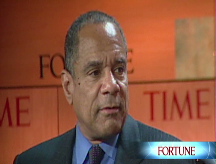Small banks want their bailout
Industry giants like Citigroup have eaten up a big chunk of the money set aside for the financial rescue plan. Now, community banks hope to get some crumbs.
NEW YORK (CNNMoney.com) -- The Treasury Department better order some new checkbooks.
So far, the Treasury Department has invested $161.5 billion in 52 companies as of last week. Another 93 banks have won approval for $48.4 billion in funds, according to analysts at Keefe, Bruyette & Woods.
And thousands more are expected to apply for government funds by the time the deadline for private and thinly traded banks expires on Monday.
As of last week, the Federal Deposit Insurance Corporation had already received approximately 1,200 applications from small community banks looking to enroll in the Troubled Asset Relief Program, or TARP.
That may come as a bit of a surprise given that many smaller banks have sidestepped the mortgage mess that has caused so many problems for the likes of Citigroup (C, Fortune 500) and other large banks.
But the slowing U.S. economy has prompted some banks to give the program a second look as they face the threat of rising loan losses in the coming year.
Paul Merski, chief economist for the Independent Community Bankers of America, said several smaller banks are applying for government funds even as board members and shareholders continue to weigh the merits and disadvantages of the program.
"There is a tremendous amount of interest in getting an application in so they have that oar in the water," he said.
Since Treasury first announced in October that it planned to inject capital into banks by purchasing preferred stakes in them, the program has faced plenty of skepticism.
Washington lawmakers have grilled bank executives as to why some institutions have hoarded the money instead of using the cash to boost lending.
And bankers have been apprehensive about the program, given its dilution to shareholder value, restrictions on executive compensation and limits on dividends for common shareholders. At the same time, the banks face the cost of paying big dividends to the government in exchange for the funds
Jim Barrett, chief financial officer of Wainwright Bank (WAIN), a Boston-based bank with a dozen locations, said that paying a dividend that starts at 5% on the preferred shares to the government plus the impact of warrants is a bit onerous.
Nonetheless, the bank announced last month that it applied for and received $22 million through TARP. Barrett said it became necessary to ask for government funding as it became difficult to access capital in the wake of the credit freeze.
"This almost couldn't have come at a better time," said Barrett, whose firm boasts $1 billion in assets.
Still, other small banks are wary of applying due to fears about what the government may force them to do in the future.
The American Association of Bank Directors and the Independent Community Bankers of America have expressed concerns that language in the original $700 billion bailout legislation allows Congress to alter the terms of the agreement as they see fit.
This is of particular concern since Democrats will have a bigger majority in Congress next year, in addition to having a Democrat in the White House.
Jason O'Donnell, a senior research analyst who tracks mid-Atlantic community banks at Boenning & Scattergood, said some bank executives are worried that lawmakers could order banks participating in the program to submit to mandatory loan modification programs, for example.
"There is a general cautiousness and skepticism about what is going to happen," he said.
Ronald Paul, the chairman and CEO of Bethesda, Maryland-based EagleBank (EGBN), said he expects to take the $38 million in government funds it qualified for but added that if Congress starts changing the terms of the program, there could be a large backlash from community banks.
Still, some smaller banks that are interested in funds are being left out in the cold. About one third of the more than 8400 institutions insured by the FDIC don't currently qualify for TARP funds.
Included in this group are mutual organizations that are unable to issue any stock as well as smaller community banks structured as S corporations, which are limited to 100 shareholders and don't sell the type of stock needed to participate in the Treasury program.
This is a problem since these institutions may be at a disadvantage to others who are able to tap the TARP funds. And many consumers and small businesses rely on these local lenders for their banking needs.
A Treasury spokeswoman confirmed that the agency was working on a program for these banks but could not give any indication on when the details might be unveiled. Some banks in this group have already anticipated such a move though and have filed applications with their respective regulators.
Compounding matters for small banks is the fact that there is only $15 billion of the first $350 billion approved for the overall bank bailout program that remains unallocated. And it is not clear that Congress will allow the Treasury to use any of the remaining $350 billion of the financial rescue package to invest more in banks.
FDIC Chariman Sheila Bair has urged Congress to consider using some of the TARP funds to create a program aimed at helping delinquent homeowners and to halt the rising tide of foreclosures. That proposal has won the support of some lawmakers.
The securities industry has also been lobbying heavily for the Treasury to purchase troubled assets from banks and securities firms, which is what Treasury Secretary Henry Paulson said he would do when he first pitched the bailout to Congress.
But Merski of the Independent Community Bankers of America said that using some of the $20 billion left to help smaller banks currently unable to access TARP would go a long way toward stabilizing the financial system. But the government needs to act soon.
"Time is running out and money is running out too," he said. ![]()


